- Home
- Helen Humphreys
Helen Humphreys Three-Book Bundle Page 11
Helen Humphreys Three-Book Bundle Read online
Page 11
Here it is, thinks Isabelle. The inevitable grab for money. “And why,” she says, “should I support a church that caters to a God I don’t believe in?”
The vicar makes litde popping sounds with his breath. Outside the room the clock runs down the hour, the whole notes of the bells dropping ripe into the silence.
The vicar recovers nicely. “Your father,” he says, “always helped our cause. Your father understood his duty to the parishioners, to the people of this village.”
Of course, thinks Isabelle. He is wily. He knows exactly what to say to make her comply with his request.
Being her father’s daughter has been such a mixed blessing. If she’d been a man, she would not get away with all she did, would be that much more tied to obligation, to having some credible career and carrying on her father’s good name in conduct and deed. As it is, she is able to live comfortably off his money, is able to do exactly what she pleases. Perhaps the inconvenience of village responsibility, manifested this morning by the puffing presence of the toady vicar, is small measure against what she has been allowed. She remembers when her father had told her he was buying this house for her and Eldon. So you’ll be settled enough, he said, to give me an heir.
Isabelle remembers her babies less and less now. The pain of them ebbs away from her and it’s as if they have drifted off, floating on the wide sea of her grief. Gone. Her body can’t call them back as it could in the first days after they’d been born. Or even her heart. Even her heart. And she wants to forget them. She wants to cancel their image entirely. Each photograph she takes now, each time she imagines and sets up a scene, pushes the memory of them farther and farther back, layered deep under all these new pictures of Annie Phelan.
“How much?” she says. “How much is it that you want?”
Annie is in the kitchen, washing the stone floor. Today is market day and Cook has gone into Tunbridge Wells to buy and order food. On market days, when Cook no longer owns the space, Annie spends half a day in the kitchen—scrubbing the floor, polishing the pots and pans. She is down on her knees with the scrub-brush and pail when she hears the sound. A whispery, rustling sound, which she finally recognizes as someone crying. She gets up, goes to the window by the door, and peers outside. There, on the bench just under the window, are Tess and Wilks. Wilks is smoking. Tess has her head in her hands and Annie can see the tremor in her shoulders that is evidence of her tears. Carefully, softly, Annie opens the kitchen door a crack, and bends her head to the space.
“Why didn’t you tell me?” says Wilks. His voice has the raspy edge of anger to it.
Silence. Tess snuffles loudly. “I didn’t know,” she says finally.
“Liar.”
“I wasn’t sure.” She tries again. “I suspected, but I didn’t know for certain until just recently.”
Even to Annie, bent over the crack of the open kitchen door, this sounds like a lie. A rehearsed lie. There’s a shifting noise on the bench. He’s comforting her, thinks Annie. He has slid across and is comforting her now. But the sound was Wilks standing up.
“I have thinking to do,” he says as he walks away.
Tess says nothing, cries harder after he has gone. Annie backs away from the door, picks up her pail, and empties the water in it down the drain. Then she takes the empty pail to the kitchen door. She makes a considerable noise walking the few feet to the bench outside, but Tess doesn’t look up.
“What is it?” Annie says, standing by the end of the bench, swinging the empty wooden pail nervously. “What has upset you so?”
“It’s not your business,” says Tess fiercely. She looks up at Annie. Her eyes are red and there’s a braid of snot hanging from her nostrils. “What are you spying on me for anyway?”
“I’m not spying,” says Annie. A lie and a sin. Do unto others, she thinks bitterly.
“Oh, just be gone from me,” says Tess, rising from the bench and running across the garden, away from Annie, after Wilks.
Annie stands by the bench and watches Tess go. It is the end of summer now. The sun is out. It hasn’t rained for days. The grasses and flowers bend to earth in the guttering heat.Go then, thinks Annie, to Tess, to the last threads of summer, tying them here, to this earth. Go then.
Come back.
Annie can’t move. Her body is wrapped tightly in cloth. She struggles her arms and legs but they remain caught. Above her the sky twists and turns, seems to be moving so fast. But it is she who is moving. The pressure she feels on her body is the weight of herself being passed from hand to hand, person to person. All along the road people have stopped working, have laid down their tools on the hard earth. Dust smokes down. Everything so still, just this baby in motion, passed from person to person, along the length of road.
Annie can feel the hands, strong as wings beneath her body. She is being shifted down this line of workers to her mother who waits at the end, arms outstretched. The relief of this, of finally having her mother back, is such a huge feeling it bursts out of her body, out of her skin, makes Annie cry out loud when, at last, her mother takes her in her arms.
Annie wakes crying. Tears are running down her cheeks. The attic room is hot and musty. She was almost there. She had almost seen her mother’s face. The dark quiets her. The room and Tess asleep in the other bed quiet her. But there is no going back to sleep after this. Her body is jangly with feeling. She takes her candle and begins the familiar journey downstairs to the baby-carriage room.
She doesn’t feel like reading, sits on the floor, puts her head down on her knees.
Why did they let her go? To save her? Has her life in England really been an escape? The workhouse. The strict labours of Mrs. Gilbey’s. Even God, whom she has been grateful for, is perhaps not the same God she would have known if she’d remained Irish. Not the same religion, so how could it be the same God?
With her head down on her knees Annie looks across the half darkness of the carriage room. She is so familiar with this place, knows the position of everything so well, that it takes her a moment to realize that something is different. One of the prams has been pushed out into the middle of the room. This place that Annie had thought was only ever visited by her has been visited by someone else.
It is an accident, really, how it happens. Annie is in the glasshouse, being photographed as Humility. She is standing against a wall, dressed in a grey cape, with the hood up. She bends her head over a small bouquet of field poppies in her clasped hands. The light from above strikes the back of her head, like a sword. She is bowed beneath the straight weight of it.
Isabelle is having a hard time deciding what Humility should look like. She has moved Annie from the doorway to the bench, and now to stand beside this wall. Cape on. Cape off. Cape on with the hood up. Flowers. No flowers.
The cape is hot. In the cave of her hood Annie is sweating. She can feel the prickle of sweat on the back of her neck. The flowers, picked over two hours ago now, are wilting in her humid grasp. She bends over as though she is coaxing the small flame of them into life.
Isabelle flits around beside the camera. Annie watches the piece of stone floor by her boots. There is moss growing in the cracks. Isabelle is saying something, but Annie has stopped listening. She lowers the flowers, rests them against her leg because her arms are cramping from holding them so still in front of her. The heads of the posy droop down towards the floor, spill their light.
“Well, if you think so,” says Isabelle. She is back behind the camera again, looking through the sight at this new position Annie has taken.
The sun illuminates the moss. The bright green of it unearthly by her boots. Annie looks up at Isabelle. I have changed the picture, she thinks, realizing what Isabelle has said. I have made her change her mind. This knowledge shivers through her. It is a bright, glittering thing. It is hers. She reaches up and pulls the hood from her head. “I think this is better,” she says, testing her new power.
Isabelle looks through the camera. Humility. She can see
that it is a tenuous thing, that the submissive flowers contradict the haughty, bareheaded expression of Annie. Yes, perhaps Humility is that line, that moment before it becomes itself. She can see that Annie is right. “You’re right,” she says. “I can see what you mean.”
Annie stares out, unblinking, at the camera lens. I have made you do this, she thinks. I can make you see what I want you to.
“She was lovely,” says Tess. “Her dress the most beautiful green I’ve ever seen.” She giggles at her accidental rhyme.
They’ve just had their evening meal—Tess, Annie, and Cook—and are now having tea in the kitchen. Tess is describing how Mrs. Dashell looked when she left the house with Mr. Dashell earlier this evening, on their way to supper at the Hills’.
“Lovely,” says Tess, again. “A lovely Lady.”
“Tom drove them?” asks Cook.
“Yes.”
“Then he’ll be wanting a bit of food when he gets back.” Cook begins the slow business of rising from the table, but Tess puts out an arm to stop her.
“Don’t bother yourself,” she says. “He’ll be visiting with the stable boy there. You know how he is,” she adds, suddenly fearing she has displayed too intimate a knowledge of Wilks’s habits.
Cook sinks back down again. “If you say so,” she says, relieved not to have to be up on her feet again right away, heating up a plate of supper.
“If I could look like that,” says Tess, turning back to the sight of Isabelle Dashell stepping up into the trap. “If I could be a real Lady.”
“What would you do?” says Annie. She has been quietly listening to Tess talk and is getting bored with the endless descriptions of Isabelle’s dress.
“What would I do?” Tess looks over at Annie.
“If you were a Lady,” says Annie.
They turn the table into a stage. Cook, as the audience, sits on a chair by the range. Tess perches on a chair up on top of the table, as though it’s a throne. Annie, out of the room, knocks on the kitchen door.
“Come in,” says Cook.
Annie enters the kitchen.
“The Lady will see you now,” says Cook.
Annie walks over to the table, careful not to turn her back on Cook and spoil her view. “You asked to see me, ma’am?” she says, and bows before Tess.
“I have heard from others in this house,” says Tess, in the most imperious voice she can muster, “that you have not been mindful of your duties. That you have not been cleaning the rooms properly. At the proper time,” she says pointedly.
Annie feels herself blush. “Yes, ma’am,” she says.
“Well,” says Tess, waving her hand in what she hopes is an intimidating manner. “What have you to say in defence of yourself?”
Annie looks up at Tess, sitting on the kitchen table. Her hands are red and coarse from the washing soda she uses in the laundry, from being wet most of the day, from rubbing up against fabric. Her voice is rough and her way of speaking is ill-mannered. She will never be a Lady, thinks Annie. She can play at this because it will never happen. No Lord will swoop down and carry Tess Fairley back to his castle to be his bride.
“Answer me,” snaps Tess. “You wretched girl.”
Annie thinks of Mrs. Gilbey, of all the times she listened to her mistress abuse her. The words that slapped against her as she kneeled on the floor. The feeling of the cold stone against her bones. Slut. Heathen. Slattern. Cur. “I was forever accused and condemned,” she says.
“What?” Tess has that suspicious look on her face that signals she doesn’t understand what Annie has said.
“It’s from Jane Eyre.”
“What?”
“A book,” says Annie. “Jane Eyre is a book.”
“That’s not being fair,” says Cook. “You know she can’t read.”
“Yes,” says Tess, “that’s not being fair.”
Annie looks up at Tess on top of the table. What can she say in her defence? The truth is that at Mrs. Gilbey’s she was accused and condemned, was constantly suffering, and the only way out of this was to imagine being someone else. “I can’t do it,” she says.
“Can’t do what?” Tess is confused again.
“Oh, go on,” says Cook. “Let her be the Lady then. She seems more inclined that way, with her books and all. Just get on with it.” She pours a litde whisky into her tea, something she allows herself only when the Dashells are gone for an evening, and there is a certain looseness to the household.
“Thanks for nothing,” says Tess, climbing down awkwardly from her throne. “You’re a good bit of no fun at all.”
Annie ignores her, reluctantly takes up residence on the table. They are playing this entirely for Cook’s benefit now.
Tess eagerly banishes herself outdoors.
What would I do? thinks Annie. If I could do things?
There’s no knock on the kitchen door.
“Come in,” says Cook anyway. To Annie she says, “I hope that wretched girl hasn’t wandered off. Come in!” she says again, this time in a more commanding tone.
The door bursts open and Tess stumbles into the kitchen, followed immediately by Wilks. Tess’s face is flushed.
Wilks is surprised to see everyone still in the kitchen. “What’s this, then?” he says. “Why’s she sitting up there on the table?”
“She’s a Lady,” says Tess, and giggles.
“She doesn’t look no Lady to me,” says Wilks. He turns his attention to Cook. “Any supper left for me, missus?” he asks.
“Yes, Tom. I’ll fetch you some.” Cook sighs, rises slowly out of her chair.
Annie climbs down, with relief, from the table. Wilks is like a stone, thrown into the calm waters of the kitchen. Now they are all rippling out, away from each other, to their own particular solitary shores.
*
Annie kneels at her bedroom window. Tess has gone out into the garden with Wilks. They are out there, somewhere, in this darkness thick as fog. She had wanted Tess to come to their room instead of going out with Wilks. Even though Tess is often a disappointment to talk to, at least she’s company, and Annie feels the need of company tonight. The episode in the kitchen has made her remember, with particular dread, her life at Mrs. Gilbey’s.
When Annie had been a young girl in Mrs. Gilbey’s house, she would lie in her windowless room off the kitchen, in her cot. There was only the smallest rivulet of light from under the door to reassure her that she wasn’t sealed away forever. In those early days, when she was a child, Mrs. Gilbey would lock her in at night, afraid Annie might wander, uncontrolled, all through the house. Taking things. Breaking things. The only way for Annie to muffle the terror of this entombment was to talk out loud to herself, pretending that her own voice was the voice of another, offering comfort to a frightened child. Tonight, now, she wants Tess to be that voice of comfort, wants words to be sparks and light the darkness of the room.
Annie can see a figure rushing out into the garden. It’s not Tess. It’s Isabelle, the dark stain of her dress washing out behind her as she runs to the glasshouse. They must be back from supper. Annie waits for the glow of a lamp to light up the studio, make the whole glasshouse itself seem like a lantern God swings across the darkness of the garden.
Eldon has followed his wife down the dark ocean of garden and into the glasshouse. “Don’t go,” he says, even though he is right behind her and she can’t go any farther away from him.
Isabelle lights a lantern, swings it forward to set it on the bench, and the light flexes against the panes of glass, makes them glisten. “Why do we do it?” she says. “It’s a sham. A pretence. Sitting there in their drawing room chattering politely about the cattle plague. What a shame not to have beef as often as we would like.” She puts her hand on the top of her camera, takes it off again. “Sometimes I despise this world I was born to,” she says.
“You don’t mind the privilege it affords you.” Eldon steps forward. He has the sensation that he is receding out of this pool o
f light, floating right out of the glasshouse altogether. “Why did you marry me?” he says, and it’s not what he wanted to say at all. What he wanted to say was, Why do you complain about what benefits you? Why do you pretend you could be different, that you could be someone other than who you are? But no, instead he says, Why did you marry me? Although they might be the same question after all.
Isabelle looks across the studio at Eldon. He is blurry with shadow. He is the place where the light ends, where it bumps up against darkness like a boat nudging the shallows. Because you didn’t get in my way is what she wants to say. Instead she says, “Because I was expected to be a certain kind of person, to behave in a certain way, and you didn’t expect that from me. You didn’t expect anything from me.”
“And is that what happened?” asks Eldon. “I didn’t expect anything from you?”
“Isn’t it a good arrangement?” says Isabelle. “Doesn’t it suit us both?”
“We do our work. Your father bought us this house. We have his money. A good arrangement.” Eldon stretches the last word out. He thinks of all the Arctic expeditions, of the months and months of preparation required before the first step was ever taken on the ice. This is what his marriage to Isabelle feels like, preparation. But what’s it all for? What is the place that pulls them forward over the polar floes, over the ground cold with stone? “What if the children had lived?” he says.
Isabelle can’t think of this. She goes through each day never allowing herself to think this. Instead she concentrates on the photograph she is taking, the one she hauls from the developing bath. What she can create. What she can control. Life is accidental. Art is thick with purpose. “Would I have loved you?” she says, because this is the real question.
The garden outside the glasshouse is a tangle of moonlight. Leaves and vines, the angles of branches. The relentless intent of the natural world both reassures and frightens Isabelle. What if art is not the greater power? What if art is an excuse to hide from life? What if her babies had lived? Would she have been able to love them? “We’ll never know,” she says, “will we.”

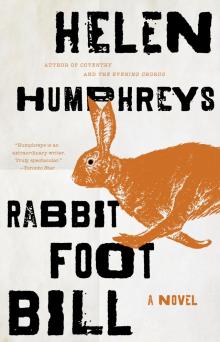 Rabbit Foot Bill
Rabbit Foot Bill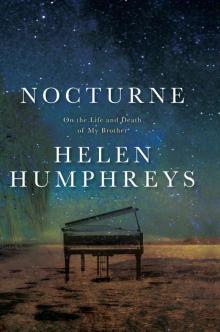 Nocturne
Nocturne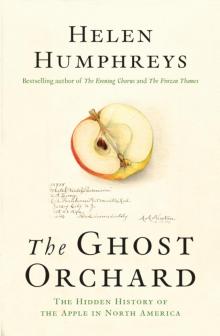 The Ghost Orchard
The Ghost Orchard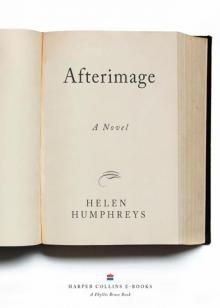 Afterimage
Afterimage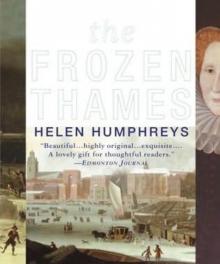 The Frozen Thames
The Frozen Thames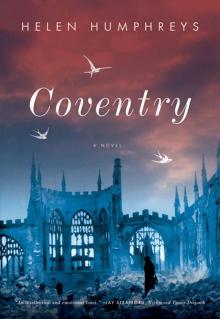 Coventry: A Novel
Coventry: A Novel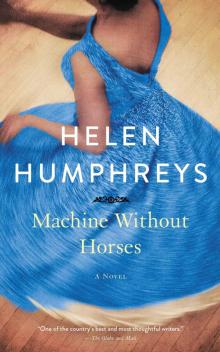 Machine Without Horses
Machine Without Horses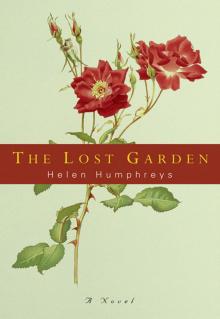 The Lost Garden: A Novel
The Lost Garden: A Novel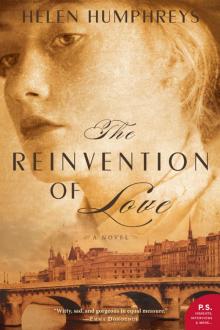 The Reinvention of Love
The Reinvention of Love Helen Humphreys Three-Book Bundle
Helen Humphreys Three-Book Bundle